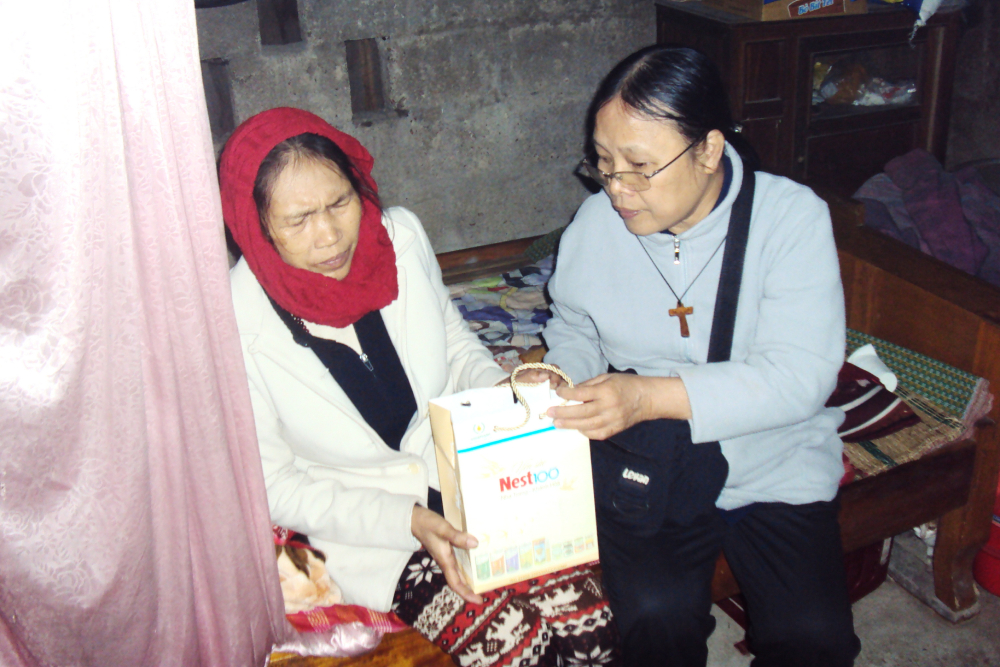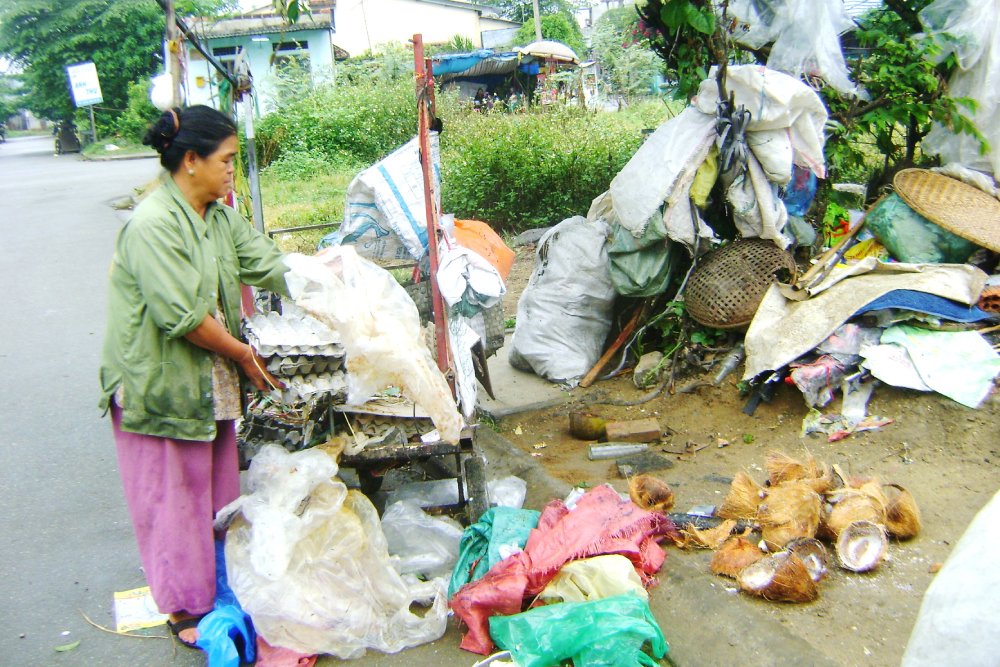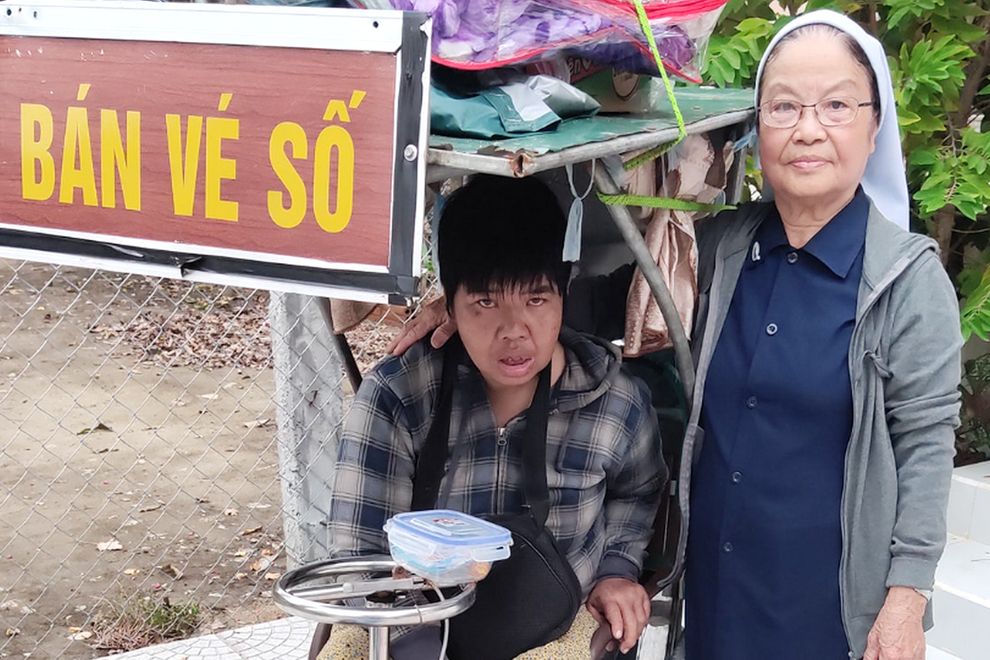
Sr. Mary Vu Thi Ngoc (right) offers a gift to a patient who suffers from domestic abuse on Mar. 6 in Phong Dien district of Thua Thien Hue province, Vietnam. (Joachim Pham)
Editor's note: This story is part of Global Sisters Report's yearlong series, "Out of the Shadows: Confronting Violence Against Women," which will focus on the ways Catholic sisters are responding to this global phenomenon.

(GSR logo/Olivia Bardo)
Nguyen Thi Voi pushes a three-wheeled cart through the streets in Phong Dien district of Thua Thien Hue province in central Vietnam each day, collecting scraps to survive.
Voi has deep scars on her back and shoulders and is unable to ride a bicycle due to a partially paralyzed left arm — a permanent injury inflicted by her abusive husband.
"I'm still haunted by the savage beatings I endured from my late drunken husband," Voi, an orphan who married 28 years ago, told Global Sisters Report.
Voi was a housewife while her husband sold ice cream from a bicycle.
"I wouldn't have survived without the help of the sisters," Voi said. They comforted her, provided medicine and food, and even taught her how to avoid her husband's wrath.
The 50-year-old mother of two described her husband as controlling, treating her like a servant. He constantly berated and beat her, forbade her from using a phone, and controlled all their finances.
Voi recalled an incident in 2022 when she found her husband passed out drunk on the roadside, his wallet missing. When he sobered up, he accused her of stealing his money, threw food at her and slashed her back with a knife. Her screams drew the attention of neighbors, who rushed her to the hospital.
Following this attack, he was sentenced to two and a half years in prison for intentionally causing injury. Upon his release, her husband moved to the neighboring Da Nang city district to work as a bus assistant. He died in a traffic accident last December.

Nguyen Thi Voi loads her three-wheeled cart with scraps on Mar. 5 in Phong Dien district of Thua Thien Hue province. (Joachim Pham)
According to a 2023 report, the Vietnamese government recorded 3,240 cases of domestic violence across 3,122 households. Physical violence was the most common, with 1,520 cases, followed by psychological abuse with 1,404 cases, economic abuse with 230 cases, and sexual violence with 110 cases. Among the 3,193 victims, 2,628 were women.
Voi endured years of abuse, even after her children married and moved away. "I had no choice but to endure it," she said. "Neither my neighbors, including my husband's relatives, nor the local authorities stepped in to stop the abuse. They all saw it as a private family matter."
Daughters of Mary of the Immaculate Conception Sr. Mary Vu Thi Ngoc, who has provided Voi with regular medical support for years, noted that in the past, Voi lived in constant fear and never dared to speak about the violence she suffered.
"We comforted her and taught her how to escape and protect herself whenever her husband became violent," said Ngoc, who oversees the congregation's ministry for the sick and distressed.
She told Global Sisters Report that Voi's life has now taken a positive turn. "We are happy that she is starting to wear a cheerful smile. She is in less pain because she no longer suffers from his abuse."
Ngoc's team, composed of three sisters and 15 lay volunteers, has rescued 48 women from domestic abuse by assisting with medical expenses, repairing homes and providing them with financial support to help them start small businesses.
Eight victims currently reside in a shelter run by the Daughters of Mary of the Immaculate Conception, where they receive vocational training, study self-defense techniques and learn problem-solving skills to protect themselves, seek help, and reach out to the nuns when needed. Over the past three years, 60 women have successfully reconciled with their husbands through these efforts.
Ngoc, a psychologist and social worker, explained that it is difficult to keep victims away from their families long enough to help them heal. Many leave within a few days, feeling ashamed and self-conscious about staying in a shelter.
"They are haunted by their husbands' violence and don't want to be seen as homeless," she said.
Advertisement
The 62-year-old nun recalled a woman who was severely beaten by her jealous husband, splitting her lip. Neighbors took her to the sisters' clinic, but she panicked, ripped off her bandages, refused medication and attempted to flee.
The sisters intervened, comforting her and persuading her husband to apologize. Over time, she forgave him, and he gave up his violent ways, allowing them to rebuild their relationship.
Ngoc explained that many victims have little education, live in remote areas and financially depend on their spouses. Fear of social shame prevents them from seeking legal help, leading them to endure domestic violence to "save face."
"In a patriarchal society, men see themselves as the head of the household and expect their wives to obey them unconditionally," she said.
Missionaries of Charity Association Sr. Teresa Le Thi Tung, who works with the Daughters of Mary's shelter and is in Ha Tinh province, attributes domestic violence to men who are abusive, jealous, unemployed, addicted to alcoholism and gambling, have poor education, mental health issues and a general sense of despair.
Tung, a gender psychology specialist, explained that many men view their wives as subordinates and resort to violence to assert authority rather than expressing care, love and respect.
"Women often endure various forms of violence, including verbal abuse, physical assault, and mistreatment over trivial matters," she told Global Sisters Report.
Tung recounted a woman was verbally and physically abused by her husband for spending large sums of money on gambling. To avoid his wrath, she lied, claiming she was learning tattooing to earn a living. Eventually, she sought help from the nuns.
"We taught her how to cook proper meals, care for her husband and children, and quit gambling. Thanks to this, her husband learned to control his temper, and they were able to reconcile," Tung said.
She acknowledged the challenges in persuading alcoholic and violent men to change. Some even vandalize the shelter and hurl insults at the nuns.
"We have to call upon parishioners and local authorities to intervene," she said.

Sr. Anna Le Thi Hue gives food to a disabled woman who is forced to sell lottery tickets by her relative on Mar. 6 in Phu Loc district of Thua Thien Hue province. (Joachim Pham)
The nuns also conduct domestic violence prevention workshops at parishes, offer psychological therapy for victims, provide microloans for women to start businesses, help repair homes and cover school fees for children — all aimed at empowering women and reducing domestic violence.
Daughters of Our Lady of the Visitation Sr. Anna Le Thi Hue in Hue noted that some men falsely accuse the nuns of luring their wives away and attempting to convert them to Christianity.
"The authorities have come to investigate these claims, but after speaking with the victims, they understand our mission and dismiss the false accusations," Hue told GSR.
Hue, who oversees the Daughters of Our Lady of the Visitation's charity work, also highlighted the plight of people with disabilities, many of whom are forced by others to beg or sell lottery tickets.
"We provide them with food, clothing, wheelchairs, crutches and prosthetic limbs so they can support themselves and their families rather than relying on others and being abused," she said.
The nuns also offer shelter, maternity care and job training for pregnant women abandoned by their partners, helping them live independently and raise their children with dignity.
Voi finds satisfaction in her life though she struggles with high blood pressure and earns just 40,000 dong ($1.60) daily from collecting scraps.
"I will ask the nuns to help me repair my house to stay during the rainy season. But I'm content knowing that I can now live freely," she said.





